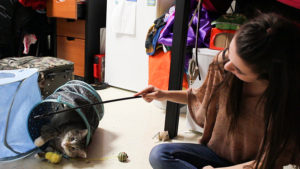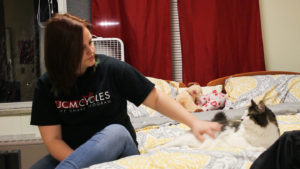By ANDREA LOPEZ
Multimedia Editor
(WARRENSBURG, Mo., digitalBURG) — “That was kind of the moment I knew he was the one,” said Katie Oparnico, senior ceramic studio art major.

PHOTO BY ANDREA LOPEZ / MULTIMEDIA EDITOR
Amber Patton plays with her cat, Simon, who is her emotional support animal, in her dorm room.
When Oparnico saw a cat named Barnes at the Wayside Waifs animal shelter in Kansas City, Missouri, the furry feline became her emotional support animal.
“I didn’t realize how stressful this semester was going to be,” Oparnico said.
And she’s not the only one who feels that way.
In fact, 44 students living on campus currently have an emotional support animal, according to the UCM Office of Accessibility Services.
Working at UCM for the past 21 years, Barbara Mayfield, the ADA/504 coordinator and director of accessibility services, said it’s been interesting to see how things have changed over the years.
“When I first came here, more of our students had a learning disability or attention deficit than any other of the categories,” Mayfield said. “The largest category on our campus and across the country is mental health.”
While mental health issues seem to be the norm on college campuses, a newer trend to help students cope with the disability is having an animal to comfort them at home.

PHOTO BY ANDREA LOPEZ / MULTIMEDIA EDITOR
Simon is one of 44 animals providing emotional support for UCM students on campus.
Mayfield said that when most people come home, their cats and dogs provide emotional support for them,” Mayfield said.
However, the dogs and cats living on campus aren’t seen as pets.
“We don’t usually call it a pet,” Mayfield said. “It is achieving a status for a person with a disability. It’s more of what its title indicates – to give that emotional support.”
Amber Patton, junior early childhood education major, said getting her Siamese cat Simon made all the difference.
“I have severe depression,” Patton said. “I’ve been hospitalized. I’ve self-harmed. But, I’m excited to come home after a long day instead of just coming to my room and crying and wanting to be alone. I’m never alone because I have him.”
Last time Patton went home for a weekend, her mom told her that Simon was the best thing that’s happened to her.
“Everyone deserves to have what I have with him,” Patton said. “Everyone deserves to be happy and have, even if it’s not physically, a person being there for you, they do just as well.”
But, it’s not as easy as saying you want a puppy or a kitten to help you feel better. There’s a process.
“I know that other people feel that people in my situation fake having a mental illness in order to get an animal, which isn’t the case,” Oparnico said.
When a student wants to get an emotional support animal, he or she must go to the office of accessibility services and have a confidential meeting with Mayfield and present documentation of the disability from an outside professional.

PHOTO BY ANDREA LOPEZ / MULTIMEDIA EDITOR
Katie Oparnico sits on her bed with her emotional support animal, Barnes. Oparnico got Barnes from the Wayside Waifs animal shelter in Kansas City, Missouri.
“It might be from a medical doctor or a counselor or a therapist,” Mayfield said. “For any of the students we work with, their documentation is confidential. It stays here. It doesn’t comingle with any other university files or records.”
The only exemption is informing the housing office that the student has met qualifications for having an emotional support animal. For students living off campus, they have opportunities to get the same services, as landlords are held to the same standard.
As a community advisor in the University Conference Center, Oparnico said her emotional support animal doesn’t just help her, but also those living near her.
“(Barnes) has the ability to get other people to open up,” she said. “I’m able to do that, but, he also helps, like, people, as far as my residents or even some fellow employees, if they’re having a bad day, they’ll come in and kind of start hanging out with him and start opening up about what’s going on in their own life.”
For senior social work major Katy Cooper, who has been battling bipolar disorder, depression and anxiety, having her emotional support cat Harlow has been no different.
“The first time I knew that it was helping me was when I was crying over nothing, you know, bipolars cry out of nowhere, and (Harlow) came out of nowhere, got on my chest and just laid there,” she said. “That’s how I knew it was starting to help because this being, this furry being, actually loves me. You think of a dog doing that, but a cat does it too.”
On the plus side, Cooper said cats can’t argue with you.
“If you come home, like if you bomb a test, and know you’ll have someone be like, ‘Well, you should have studied more.’ These cats will be like, let me just cuddle you until you feel better.”’
While students may be hesitant to utilize resources within the office of accessibility services, Mayfield said it’s ultimately their right.
“With some students, they will say, ‘Well, I tried to do this, school, without help.’ And I explain to them, it’s not help,” Mayfield said. “We don’t provide help. It’s your right to these services.”
When students go through the process of getting an emotional support animal, Mayfield mentions other accommodations that may benefit the student in accordance to his or her documented disability. And most of the time, they take advantage of them.
“If it’s getting in the way of them making the grades that they have the capacity to make, then why not utilize that service?” Mayfield said.
“There are still so many people who think that if you’re blind or deaf or in a wheelchair, that’s what we do,” Mayfield said. “That may be about 30 people on campus, and we do many things to help them with equal opportunity, but that leaves another 740 or so that you can’t tell that they have a disability and like it that way.”



Leave a Reply